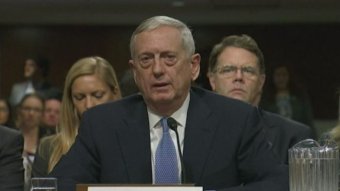What does Donald Trump really think about NATO and Australia?
Updated
This is a significant week for America's relationship with the rest of the western world.
Key points:
- US Defence Secretary to hold NATO talks with Australia, European and Middle East
- US wants NATO to play greater role in counter-terrorism
- Other countries eager to hear how US will react to Russia's intervention in Syria
For months, diplomats have been telling each other to judge Donald Trump's administration on its actions, not words or tweets.
A lot is expected of US Defence Secretary James Mattis as he arrives in Brussels to hold eagerly anticipated meetings behind closed doors with his Australian, European and Middle Eastern counterparts.
First up General Mattis has a ministerial gathering at NATO, an organisation Donald Trump has called "obsolete".
Worried European countries are demanding to know how central the alliance is to America's strategic plans and will be desperate to hear what he thinks about a resurgent Russia — does the United States see it as a threat?
Here General Mattis will no doubt deliver a fairly blunt message that European countries spend more to defend themselves.
It has been a consistent call from Washington for years.
Just five NATO members currently meet the military expenditure target of 2 per cent of GDP — Estonia, Greece, the UK, Poland and the US.
America also wants the alliance to be more flexible and able to act in way it deems more useful.
For example, it would like to see NATO play a greater role in tackling terrorism or intervening to prop up struggling nations.
But to convince members to spend more, or indeed do more, they have got to be convinced the alliance is heading in the right direction, so there is hope General Mattis will use the talks to sketch out what he thinks is in store for NATO's future.
Next, he will chair a meeting of the very large anti-Islamic State Coalition.
Many countries want to hear how the new US administration thinks it can fully eradicate the terrorist group and what it is going to do about Russia's intervention in Syria.
These talks are also an opportunity for key allies to snare some precious one on one time.
On the sidelines, Marise Payne will become the first Australian minister to hold a bilateral meeting with a member of the Trump administration.
It is a chat that is likely to garner a fair bit of attention, given the recent tense phone call between the Prime Minister and the President.
To Australia and the western world, General Mattis is expected to deliver predictable messages about the great importance of America's allies, friends and partners.
But on a few occasions it seems he has been at odds with his unpredictable boss.
While the calming words of a well-known, well-regarded Defence Secretary will provide some reassurance, many at these meetings in Brussels will be trying to get a better insight into exactly what the new President really thinks.
Topics: government-and-politics, security-intelligence, defence-and-national-security, belgium, united-states, australia
First posted








